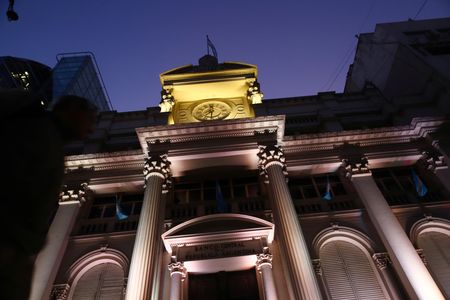By Libby George and Jorgelina do Rosario
LONDON (Reuters) -Investors have piled back into bonds in Pakistan and Argentina following cash infusions and optimism over multilateral support, but the two nations have secured only enough help to limp to autumn elections, experts said.
The rally in international bonds issued by the two countries has intensified over the past two weeks, seeing returns on Pakistan’s bonds soar to above 45% and Argentina’s close in on 30% year-to-date, making them some of the best performers in their asset class, according to JPMorgan data.
But the boost in the bonds belies the difficulties both nations face implementing major reforms once new leaders arrive after upcoming elections.
“Its not enough to resolve the country’s issues – not nearly enough,” said Carlos de Sousa, emerging market portfolio manager at Vontobel Asset Management said of Pakistan’s recent funding gains, adding Argentina’s challenges are also immense.
Pakistan’s 11th hour deal for $3 billion from the International Monetary Fund (IMF), after months of talks got official approval this week. Saudi Arabia and the UAE followed with $2 billion and $1 billion infusions.
This fresh cash means Pakistan is unlikely to default on its debt in the next six to nine months, said de Sousa. Elections in the politically volatile country must be held by early November.
Reserves remain precariously low at $9.8 billion as of 7 July, only roughly two months of imports. JPMorgan pegs its external financing needs at greater than $30 billion.
Even in the near-term, Pakistan will have to stay on top of tricky reforms such as allowing its currency to move somewhat freely.
“Pakistan has a history of undershooting fiscal targets and the risk of fiscal slippage is high in an election year,” JPMorgan said in a note.
The real challenge for Pakistan, which is still recovering financially and physically from last year’s devastating floods, comes after the contentious elections, when it will likely need to secure a longer-term IMF program.
This will likely require punishing, and unpopular, cuts to food and fuel subsidies, increases to electricity prices and loosening controls on the rupee.
“It gives some space for them to be able to go through the political moment that they’re going through now,” said Roberto H. Sifon Arevalo, head of global sovereign & international public finance ratings at S&P Global, adding “its still a very complicated political situation.”
Reflecting the challenges ahead, the Pakistan bond rally was heavily skewed towards shorter-dated maturities.
DEEP ROOTED PROBLEMS
In Argentina, infamous for its chaotic cycles of debt and default, problems are even more deeply rooted. South America’s second-largest economy is teetering on the edge of recession, with inflation topping 100% and a currency that keeps depreciating in official and parallel markets.
International reserves are at record lows, and the nation is struggling to stay current on a $44 billion IMF programme, a loan secured last year to refinance a failed 2018 bailout.
Battling an acute dollar scarcity, in June it paid part of $2.7 billion due to the Washington-based lender with Chinese yuan from a Beijing swap line.
Argentina’s bond gains, investors said, reflected the IMF’s commitment to Buenos Aires – accounting for roughly 28% of the fund’s total lending.
The first test of what’s to come will be Argentina’s mandatory primary vote on Aug. 13 in advance of a general election in October.
“The outcome doesn’t translate in who will sit in the presidential palace, but it will show the candidates that are performing well,” said Jimena Blanco, chief analyst at Verisk Maplecroft.
Investors and pollsters said the tough times could force Pakistan and Argentina’s leaders to reckon with needed fiscal reforms.
“The Peronist government faces a high chance of losing the election,” said Alejandro Catterberg, director of Buenos Aires-based polling firm Poliarquia. “The disappointment and frustration among Argentines are running at the highest level in the last two decades”.
Peronist candidate and current economy Minister Sergio Massa will face a suite of rivals, including a coalition of centrist Horacio Rodriguez Larreta and conservative Patricia Bullrich, and leading far-right contender Javier Milei.
Whoever wins, reality won’t leave much choice in policy making, said Shamaila Khan, head of fixed income for emerging markets and Asia Pacific at UBS Asset Management.
“They have run down reserves to a point where they really don’t have much of a choice going forward.”
(Reporting By Libby George and Jorgelina do Rosario, additional reporting by Rodrigo Campos, editing by Karin Strohecker and Toby Chopra)





